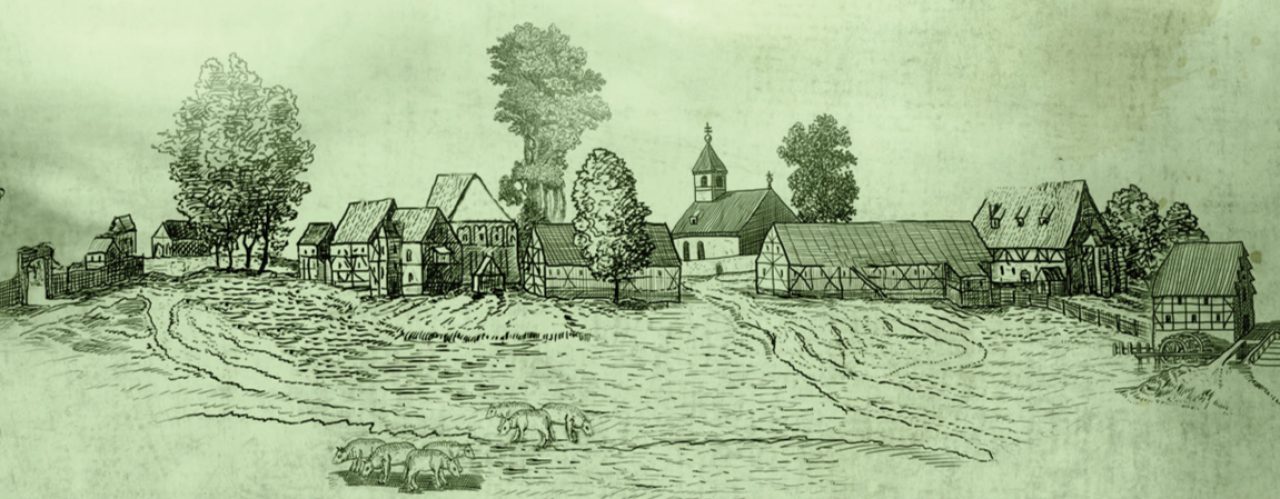“It is June 1349. In the Hampshire village of Meonbridge, the worst plague in England’s history has wiped out half its population…”
We call that plague the Black Death. At the time they referred to it as the great death, the mortality or the pestilence. It arrived in England in June 1348 and lasted a matter of months in any one location, although overall, as it spread relentlessly across the country, it persisted for the best part of two years.
It’s hard to imagine how shattering the plague’s arrival must have been. It was of course quite terrible enough in itself, but it followed in the wake of two other appalling disasters: overpopulation and severe poverty in the first decade of the century, ruinous weather, disastrous harvests and devastating famines in the second.
We know now that this appalling, terrifying disease was caused by a bacterium, Yersinia pestis, carried by a flea that lives on the black rat. Then, such a disease – like other natural (or perhaps man-made) disasters – was presumed to be God’s punishment for man’s sin. This would, I think, have been what priests would have taught their congregations. Yet people might have wondered which of their sins could be so great that God would want to punish them so severely. And how fearful they must have been when they saw how randomly the plague found its victims – rich and poor, old and young, reprobate and innocent.
How on earth did people cope with such continual calamity?
This was the question I asked myself when I set out to write Fortune’s Wheel. But I didn’t really want to write a novel about the Black Death. Rather, I was interested in what happened after the plague had passed on, leaving communities with, on average, half of their previous population.
Social change had in fact already begun in rural manorial communities, with the feudal system of lords and peasants starting to break down. But the huge demographic shift that resulted from the simultaneous deaths of so many people during the plague accelerated that change. It is an interesting period of social history.
But imagine the sheer turmoil that must have ensued, not only in society as a whole, but also at a personal level.
Women lost husbands, men lost wives, and both lost children. Young people were orphaned and had to learn to fend for themselves. Workers realised they were now a scarce resource and had some bargaining power, and said so, while their lords and masters tried hard to cling on to the status quo and keep the workers in their place. As the peasants rebelled against the old ways, priests railed against the upsetting of God’s pre-ordained social order, and preyed upon people’s fears of further divine retribution for their sinful lives.
Yet, amidst all this turmoil and fear, normal life must have continued: fields had to be ploughed and sown, crops harvested, meals made. People fell in and out of love. Babies were born and children cherished. Friendships and families were sometimes put under strain. Resentments boiled, some of which found reconciliation, while others ended in treachery.
And all that is the story of Fortune’s Wheel.

Interesting news of yours about the plague haunting through all parts of Europe and its consequences for the local societies.
LikeLike
Many thanks – I’m glad you enjoyed reading it!
LikeLike
Whsn is the book out
LikeLike
I’m not sure yet – perhaps sometime in November? I’ll announce the publication date here as soon as I know it. Thanks for your interest!
LikeLike
I’ve finally found a few spare minutes … your posts are always so interesting, I’m going to have to mark this blog as my Coffee Break Visit !
LikeLike
Sounds interesting and it certainly presents a point of view that I don’t think very many have considered before. The book should prove to be an interesting read.
LikeLike
Thank you, Anthony. I hope you get the chance to read the book!
LikeLike